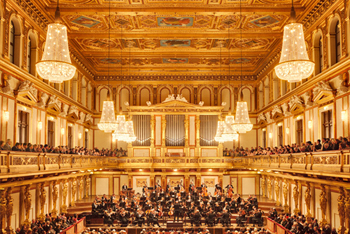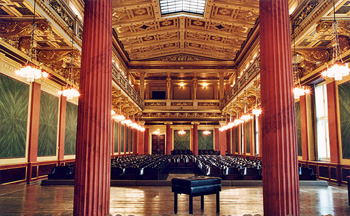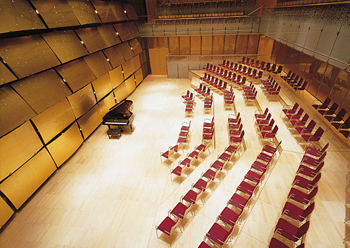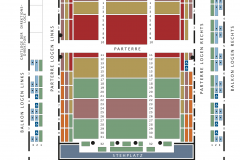Vienna Philharmonic Orchestra Musikverein Golden Hall
Mo | Tu | We | Th | Fr | Sa | Su |
Program and cast
15th, 16th, 17th, and 18th March 2025
Vienna Philharmonic Orchestra
Yannick Nézet-Séguin, Conductor
Yefim Bronfman, Piano
Programme
Ludwig van Beethoven
Piano Concerto No. 3 in C minor, Op. 37
Richard Strauss
Ein Heldenleben. Symphonic Poem, Op. 40
29th and 30th March 2025
Vienna Philharmonic Orchestra
Franz Welser-Möst, Conductor
Christiane Karg, Soprano
Maximilian Schmitt, Tenor
Mauro Peter, Tenor
Programme
Pasticcio with Music, Arias, and Duets from Operettas by Johann Strauss Jr.
5th, 6th, 8th, and 9th April 2025
Vienna Philharmonic Orchestra
Christian Thielemann, Conductor
Augustin Hadelich, Violin
Gautier Capuçon, Cello
Programme
Johannes Brahms
Concerto for Violin and Cello with Orchestra in A minor, Op. 102, "Double Concerto"
Johannes Brahms
Symphony No. 4 in E minor, Op. 98
2nd, 3rd, and 4th May 2025
Vienna Philharmonic Orchestra
Mirga Gražinytė-Tyla, Conductor
Yuja Wang, Piano
Programme
Raminta Šerkšnytė
Midsummer Song
Pyotr Il'yich Tchaikovsky
Piano Concerto No. 1 in B flat minor, Op. 23
Jean Sibelius
Lemminkäinen and the Maidens of Saari. Legend, Op. 22/1
The Swan of Tuonela. Legend, Op. 22/2
Lemminkäinen Goes Home. Legend, Op. 22/4
26th May 2025
Vienna Philharmonic Orchestra
Thomas Adès, Conductor
Igor Levit, Piano
Programme
Joseph Haydn
Symphony in A major, Hob. I:64, "Tempora Mutantur"
Thomas Adès
Piano Concerto with Orchestra
György Kurtág
Petite musique solennelle en hommage à Pierre Boulez
Pierre Boulez
"Messagesquisse" for seven cellos
Leoš Janáček
Taras Bulba. Rhapsody for Orchestra based on a tale adapted by Nikolai W. Gogol
6th, 7th, 8th, and 10th June 2025
Vienna Philharmonic Orchestra
Franz Welser-Möst, Conductor
N. N., Mezzo-soprano
Daniel Behle, Tenor
Programme
Joseph Haydn
Symphony in C minor, Hob. I:52
Gustav Mahler
Das Lied von der Erde. Symphony for two solo voices and orchestra after Hans Bethge's "The Chinese Flute"
20th, 21st, 22nd, and 23rd September 2025
Vienna Philharmonic
Tugan Sokhiev, Conductor
Martha Argerich, Piano
Program
Sergei Prokofiev
Piano Concerto No. 3 in C Major, Op. 26
Igor Stravinsky
Petrushka. Suite [Original Version 1911]
25th and 26th October 2025
Vienna Philharmonic
Singverein der Gesellschaft der Musikfreunde in Wien
Tugan Sokhiev, Conductor
Nikola Hillebrand, Soprano
Program
Johann Strauss II
Overture to the Operetta "Indigo and the Forty Thieves"
Artist’s Life. Waltz, Op. 316
Praise of Women. Mazurka Polka, Op. 315
Tales from the Vienna Woods. Waltz, Op. 325
Wine, Women, and Song. Waltz, Op. 333
Festival Quadrille, Op. 44
Voices of Spring. Waltz, Op. 410
Perpetuum Mobile. Musical Joke, Op. 257
The Beautiful Blue Danube. Waltz, Op. 314
Georg Breinschmid
Schani 200. Homage to Johann Strauss II (World Premiere)
1st and 2nd November 2025
Vienna Philharmonic
Christian Thielemann, Conductor
Program
Samy Moussa
Elysium
Anton Bruckner
Symphony No. 5 in B-flat Major, WAB 105
6th, 7th, and 8th December 2025
Vienna Philharmonic
Jakub Hrůša, Conductor
Program
Zoltán Kodály
Dances from Galánta [Orchestral Version]
Béla Bartók
“The Miraculous Mandarin,” Op. 19, (Ballet Suite)
Antonín Dvořák
The Wood Dove. Symphonic Poem, Op. 110
Leoš Janáček
Taras Bulba. Rhapsody for Orchestra
18th, 20th, and 21st December 2025
Vienna Philharmonic Orchestra
Franz Welser-Möst, Conductor
Program
Ludwig van Beethoven
Overture No. 3 to the Opera "Fidelio", Op. 72 (“Leonore Overture”)
Richard Strauss
Metamorphosen, Study for 23 Solo Strings, AV 142
Ludwig van Beethoven
Symphony No. 5 in C Minor, Op. 67
30th and 31st December 2025, 1st January 2026
Vienna Philharmonic
Yannick Nézet-Séguin, Conductor
16th, 17th, and 18th January 2026
Vienna Philharmonic
Daniel Harding, Conductor
Program
Richard Strauss
Don Juan. Symphonic Poem, Op. 20
Joseph Haydn
Symphony No. 49 in F Minor, Hob. 1/49 (“La Passione”)
Richard Strauss
Don Quixote. Symphonic Poem, Op. 35
14th and 15th February 2026
Vienna Philharmonic Orchestra
Andris Nelsons, Conductor
Program
Wolfgang Amadeus Mozart
Symphony in C Major, KV 425, “Linzer”
Antonín Dvořák
Symphony No. 6 in D Major, Op. 60
20th, 21st, and 22nd February 2026
Vienna Philharmonic Orchestra
Andris Nelsons, Conductor
Lang Lang, Piano
Program
Béla Bartók
Piano Concerto No. 3, Sz 119
Gustav Mahler
Symphony No. 1 in D Major
19th, 21st, 22nd, and 24th March 2026
Vienna Philharmonic Orchestra
Zubin Mehta, Conductor
Pinchas Zukerman, Violin
Program
Edward Elgar
Violin Concerto in B Minor, Op. 61
Ludwig van Beethoven
Symphony No. 8 in F Major, Op. 93
17th, 18th, and 19th April 2026
Vienna Philharmonic Orchestra
Sir Simon Rattle, Conductor
Program
Gustav Mahler
Symphony No. 9 in D Major
1st, 2nd, and 3rd May 2026
Vienna Philharmonic Orchestra
Andris Nelsons, Conductor
Wiebke Lehmkuhl, Alto
Chor - Vienna Boys' Choir
Chor - Singverein der Gesellschaft der Musikfreunde in Wien, Women's Choir
Program
Gustav Mahler
Symphony No. 3 in D Minor
16th, 17th, 20th, and 21st May 2026
Vienna Philharmonic Orchestra
Riccardo Muti, Conductor
Program
Joseph Haydn
Symphony in B Major, Hob. I:102
Joseph Haydn
Symphony No. 103 in E-flat Major, Hob. I/103 (“Drum Roll”)
Joseph Haydn
Symphony No. 104 in D Major, Hob. I:104, "London"
13th, 14th, and 15th June 2026
Vienna Philharmonic Orchestra
Lorenzo Viotti, Conductor
Musikverein Golden Hall
This building is located on Dumbastraße/Bösendorferstraße behind the Hotel Imperial near the Ringstraße boulevard and the Wien River, between Bösendorferstraße and Karlsplatz. However, since Bösendorferstraße is a relatively small street, the building is better known as being between Karlsplatz and Kärntner Ring (part of Ringstraße loop). It was erected as the new concert hall run by the Gesellschaft der Musikfreunde, on a piece of land provided by Emperor Franz Joseph I of Austria in 1863. The plans were designed by Danish architect Theophil Hansen in the Neoclassical style of an ancient Greek temple, including a concert hall as well as a smaller chamber music hall. The building was inaugurated on 6 January, 1870. A major donor was Nikolaus Dumba whose name the Austrian government gave to one of the streets surrounding the Musikverein.
Great Hall - Golden Hall
 “As high as any expectations could be, they would still be exceeded by the first impression of the hall which displays an architectural beauty and a stylish splendour making it the only one of its kind.” This was the reaction of the press to the opening of the new Musikverein building and the first concert in the Großer Musikvereinssaal on 6 January 1870.
“As high as any expectations could be, they would still be exceeded by the first impression of the hall which displays an architectural beauty and a stylish splendour making it the only one of its kind.” This was the reaction of the press to the opening of the new Musikverein building and the first concert in the Großer Musikvereinssaal on 6 January 1870.
The impression must have been overwhelming – so overwhelming that Vienna’s leading critic, Eduard Hanslick, irritatingly brought up the question of whether this Großer Musikvereinssaal “was not too sparkling and magnificent for a concert hall”. “From all sides spring gold and colours.”
Brahms Hall
 "In order not to promise too much it can be said that it has been made into the most beautiful, most magnificent, perfect example of a chamber concert hall that any of us knows in the world.” This was the reaction of a Vienna daily newspaper in October 1993 as the Brahms-Saal was presented to the public after extensive renovation work.
"In order not to promise too much it can be said that it has been made into the most beautiful, most magnificent, perfect example of a chamber concert hall that any of us knows in the world.” This was the reaction of a Vienna daily newspaper in October 1993 as the Brahms-Saal was presented to the public after extensive renovation work.
The surprise was perfect. It was a completely new hall. In contrast to the Grosse Musikvereinssaal, the Brahms-Saal had changed its appearance quite considerably over the years. When and how it acquired that slightly melancholy duskiness that was known to music lovers before 1993 cannot be precisely documented.
Glass Hall
 As a venue for events from concerts to luxury banquets, the Glass Hall / Magna Auditorium is not only the largest of the Musikverein's 4 new halls but also the most flexible in terms of usage.
As a venue for events from concerts to luxury banquets, the Glass Hall / Magna Auditorium is not only the largest of the Musikverein's 4 new halls but also the most flexible in terms of usage.
Hub podiums enable the smooth transformation of the concert hall into a conference centre, the cinema into a ballroom, or the stage into a catwalk. State-of-the-art equipment for sound, lighting, video and widescreen digital projection provide the ideal conditions for half-scenic productions.
The Glass Hall / Magna Auditorium was designed by the Viennese architect Wilhelm Holzbauer. With a height of 8 metres, the hall (including the gallery) can play host to up to 380 visitors.

 EN
EN DE
DE IT
IT FR
FR ES
ES RU
RU JP
JP RO
RO
 Seating plan
Seating plan 





